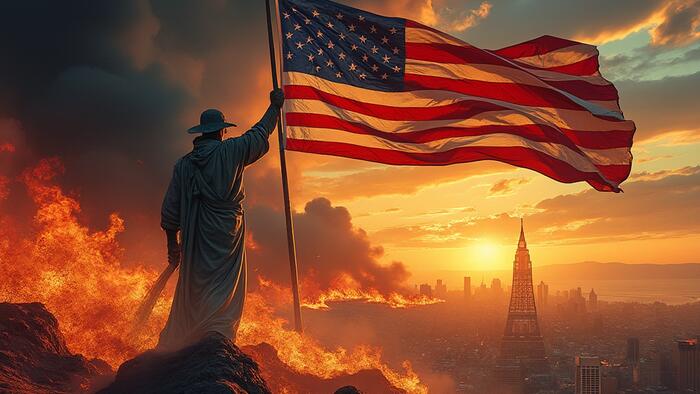In “The End of The World Frolics,” James Howard Kunstler delves into the disarray of the current political landscape, highlighting how the outgoing president, Joe Biden, grapples with feelings of despair as he reflects on his legacy while the nation faces an impending crisis. Kunstler’s portrayal of Biden is not merely sympathetic but laden with a sense of critique and irony; he likens the president’s melancholic state to that of a figure in a nightmare, haunted by a nemesis named Chrump, reflecting the chaotic energy of contemporary politics. Emphasizing the omnipresence of anxiety, he likens the repetitive chanting of “Chrump” in media to invoking a mythical beast, portraying a political class in paralysis as fears of his return shape their actions. This absurdity is compounded by the prospect of military intervention in foreign conflicts instead of addressing domestic concerns, suggesting a dysfunctional governance that may precipitate further calamity.
Kunstler raises alarms regarding the escalating military tension directed towards Russia, implicating various political figures and institutions in what he considers a reckless disregard for the potential consequences of their actions. He questions the rationale behind pursuing aggressive strategies, including missile deployments in a bid to salvage the deteriorating situation in Ukraine. The rhetoric here is stark, as Kunstler forebodes a dystopian future filled with catastrophic military outcomes, provoking a sense of urgency about the current leadership’s readiness to confront global threats with aggression rather than diplomacy. He characterizes the behavior of those in power as psychopathic, reflecting a disconnect from the grave implications their decisions hold for both domestic stability and international relations.
The commentary transitions to an exploration of U.S.-Russia relations, underscoring a historical context that reflects on the dissolution of the Soviet Union and subsequent attempts by Russia to integrate with the West. Kunstler argues that America’s perception of Russia as an adversary stems from a profound misunderstanding, claiming the nation has long sought to embrace a more normalized relationship with the West. He casts the U.S. as the aggressor, criticizing the geopolitical maneuvering aimed at destabilizing Russia for the benefit of American hegemony. This critique emphasizes that failure to recognize Russia’s attempts at rapprochement is rooted in a broader ethos of American exceptionalism and imperial ambition, which stands in stark contrast to the emergent multipolarity of the global landscape.
Further, Kunstler highlights how the so-called “blob” of the American political establishment has consistently thwarted any moves towards collaboration, opting instead for policies that sow discord and aim to exploit Russia’s resources. He critiques the narrative surrounding the Ukraine crisis as a façade for deeper economic interests, suggesting the war is not simply a struggle for territorial integrity but a battleground for corporate profiteering involving influential entities like BlackRock and Halliburton. The strategic pivot of American policy toward dismantling Russia economically appears as a misguided venture, ensnared by political ideologies that prioritize profit over peace, illuminating a cycle of conflict that persists due to entrenched interests.
The author also reflects on the domestic consequences of the U.S. policymakers’ approaches, likening them to the authoritarian tendencies reminiscent of the Soviet Union. Through comparisons to historic figures within both Russian and American contexts, Kunstler illustrates a troubling convergence of oppressive governance, censorship, and a march towards authoritarianism in the U.S. today. Here, the metaphor extends to systemic failures within institutions like the FBI and DOJ, where the erosion of civil liberties parallels the repression faced by individuals under totalitarian regimes. Kunstler’s insights provoke a conversation about the fragility of democracy in the face of rising internal corruption and external threats, as the American public increasingly finds itself navigating a landscape marred by systemic distrust.
In his closing thoughts, Kunstler offers a glimpse of hope amidst the ongoing turmoil, subtly suggesting that the potential for change lies within the upcoming political climate. He encourages critical reflection on the past, urging citizens to remain vigilant as they navigate a moment of profound uncertainty. The invocation of Thanksgiving serves as a moment for reflection, urging gratitude for resilience and the possibility of better days ahead, even as he calls for awareness of the precipice upon which the nation stands. It becomes clear that Kunstler views the coming political shifts as an opportunity for redemption; a chance to break free from the cyclical turmoil that has gripped the nation and to chart a new course that emphasizes dialogue rather than antagonism.
Ultimately, Kunstler’s piece serves as a powerful critique of current American politics, reflecting on the precarious dynamics of international relations and domestic governance. The interplay of despair and hope encapsulates the contradictory nature of the times, serving as a rallying cry for individuals to engage critically with the unfolding drama on both national and global stages. By urging readers to confront the implications of their leaders’ decisions, Kunstler positions himself within a broader narrative that seeks to reclaim agency in a world teetering on the brink of calamity, reinforcing the necessity of thoughtful engagement in shaping the future.

